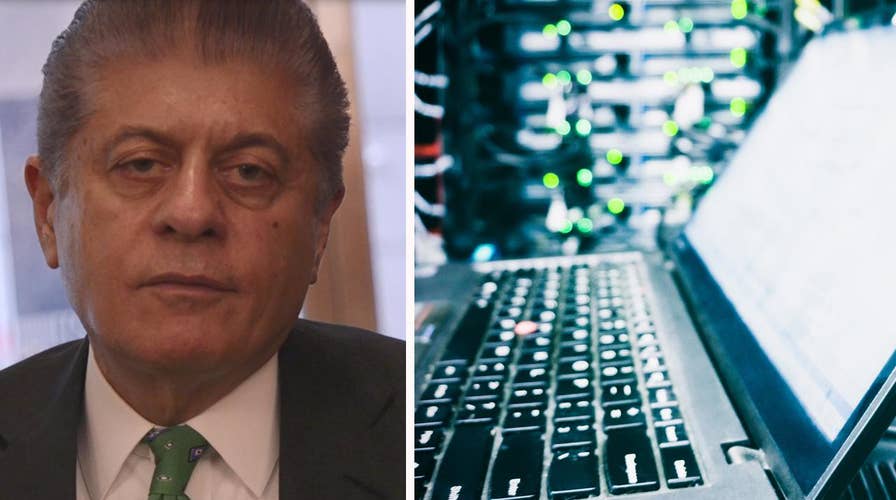Napolitano: Why FISA is the loss of our privacy
Judge Napolitano's Chambers: Judge Andrew Napolitano explains why domestic spying through FISA doesn't necessarily work and will result with the loss of our individual privacy.
Late last week, Rep. Devin Nunes, R-Calif., chairman of the House Permanent Select Committee on Intelligence, repeated his public observations that members of the intelligence community -- particularly the CIA, the NSA and the intelligence division of the FBI -- are not trustworthy with the nation’s intelligence secrets. Because he has a security clearance at the "top secret" level and knows how others who have access to secrets have used and abused them, his allegations are extraordinary.
He pointed to the high-ranking members of the Obama administration who engaged in unmasking the names of some people whose communications had been captured by the country’s domestic spies and the revelation of those names for political purposes. The most notable victim of this lawlessness is retired Lt. Gen. Michael Flynn, President Donald Trump’s former national security adviser, a transcript of whose surveilled conversation with then-Russian Ambassador to the United States Sergey Kislyak found its way into print in The Washington Post.
During the George W. Bush and Barack Obama years, captured communications -- digital recordings of telephone conversations and copies of emails and text messages -- did not bear the names of those who sent or received them. Those names were stored in a secret file. The revelation of those names is called unmasking.
Nunes also condemned the overt pro-Hillary Clinton bias and anti-Trump prejudice manifested by former CIA Director John Brennan, former Director of National Intelligence James Clapper, former FBI Director James Comey and their agents in the field, some of whose texts and emails we have seen. The secrets that he argued were used for political purposes had been obtained by the National Security Agency pursuant to warrants issued by the Foreign Intelligence Surveillance Court.
Yet Nunes voted to enhance federal bulk surveillance powers.
Bulk surveillance -- which is prohibited by the Constitution -- is the acquisition of digital versions of telephone, email and text communications based not on suspicion or probable cause but rather on geography or customer status. As I have written before, one publicly available bulk surveillance warrant was for all Verizon customers in the United States; that’s 115 million people, many of whom have more than one phone and at least one computer. And it is surveillance of Americans, not foreigners as the Foreign Intelligence Surveillance Act contemplates.
How did this happen?
It happened in the dark. The NSA has persuaded the FISC, which meets in secret and only hears the government’s arguments, to permit it to spy on any American it wishes on the theory that all Americans know someone who knows someone else who knows someone who could have spoken to a foreign person working for a foreign government that could wish us ill.
This is the so-called judicial logic used to justify the search warrant on all of Verizon’s customers. This is what happens when judges hear only one side of a dispute and do so in secret.
The FISA amendments for which Nunes and other House members voted, which are likely to pass in the Senate, would purport to make bulk surveillance on all Americans lawful. At present, it is lawful only because the FISC has authorized it. The FISA amendments would write this into federal legislation for the next six years.
And these amendments would permit the FBI and any American prosecutor or law enforcement agency -- federal, state or local -- to sweep into the NSA’s databases, ostensibly looking for evidence of crime. If this were to become law, there would no longer be any unmasking scandals, because the stored data contains the names of the participants in the communications and would be readily available for harassment, blackmail or political use.
It would also mean that the Fourth Amendment to the Constitution -- which guarantees privacy in our persons, houses, papers and effects -- would have been gutted by the very officeholders who swore an oath to preserve, protect and defend it.
Does the American public know this? Does the president?
Last week, I made an impassioned plea on Fox News Channel directly to the president. I reminded him that he personally has been victimized by unlawful surveillance and the political use of sensitive surveillance-captured data; that the Constitution requires warrants for surveillance and they must specifically describe the place to be searched and the person or thing to be seized; that warrants must be based on probable cause of individual behavior, not an area code or customer list; that the purpose of these requirements is to preserve personal privacy and prohibit bulk surveillance; and that he took an oath to preserve, protect and defend the Constitution.
About an hour later, the president issued a tweet blasting bulk surveillance and unmasking. Two hours after that, he issued another tweet supporting the enactment of the FISA amendments.
What’s going on here?
I suspect that leaders in the intelligence community hurriedly convinced the president that if he sets aside his personal unhappy experiences with them and any constitutional qualms, they will use the carte blanche in the FISA amendments to keep us safe. This is a sad state of affairs. It means that Donald Trump changed his mind 180 degrees on the primacy of personal liberty in our once-free society.
The elites in the federal government and the deep state -- the parts of the government that are unauthorized by the Constitution and that operate in the dark, what candidate Trump called “the swamp” -- have formed a consensus that marches the might of the government toward total Orwellian surveillance.
This is a march that will be nearly impossible to stop. This is the permanent destruction of the right to privacy. This is the exaltation of safety over liberty, and it will lead to neither. This is the undoing of limited government, right before our eyes.

